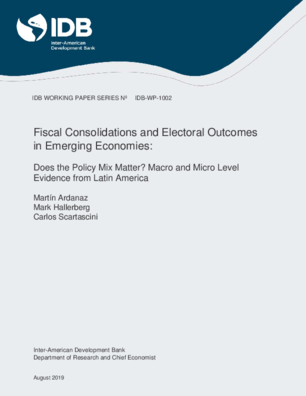Fiscal Consolidations and Electoral Outcomes in Emerging Economies: Does the Policy Mix Matter?: Macro and Micro Level Evidence from Latin America
Date
Aug 2019
Journal version
Do voters punish governments that introduce fiscal “austerity” measures? If so, does voter response vary according to the design (composition) of fiscal adjustments? What determines the timing of fiscal consolidations? The empirical literature on the political economy of fiscal adjustments, mostly OECD-based, argues that consolidations do not have significant electoral consequences. This paper re-examines these questions and finds that voters punish fiscal consolidations at the polls in Latin America and the Caribbean (LAC). To explain this result, we focus on the composition and timing of fiscal adjustments episodes. Such episodes rely fundamentally on increasing tax rates and bases of indirect taxes (such as the VAT) that hit broad segments of the population. Moreover, these policies are often implemented when politicians have no choice but to consolidate, that is, under severe economic circumstances. These macro results are corroborated with micro evidence from an original survey experiment that measures voter’s fiscal policy preferences over the business cycle in seven countries across Latin America. The experimental evidence shows that respondents prefer expenditure cuts to tax increases during recessions. This begs the question—if tax increases are more electorally costly, why do governments rely on them? It is argued the policy choice set available to pursue fiscal consolidation is relatively narrow in LAC, suggesting that investments in fiscal capacity are needed to expand the policy toolset of governments in the face of negative shocks.




